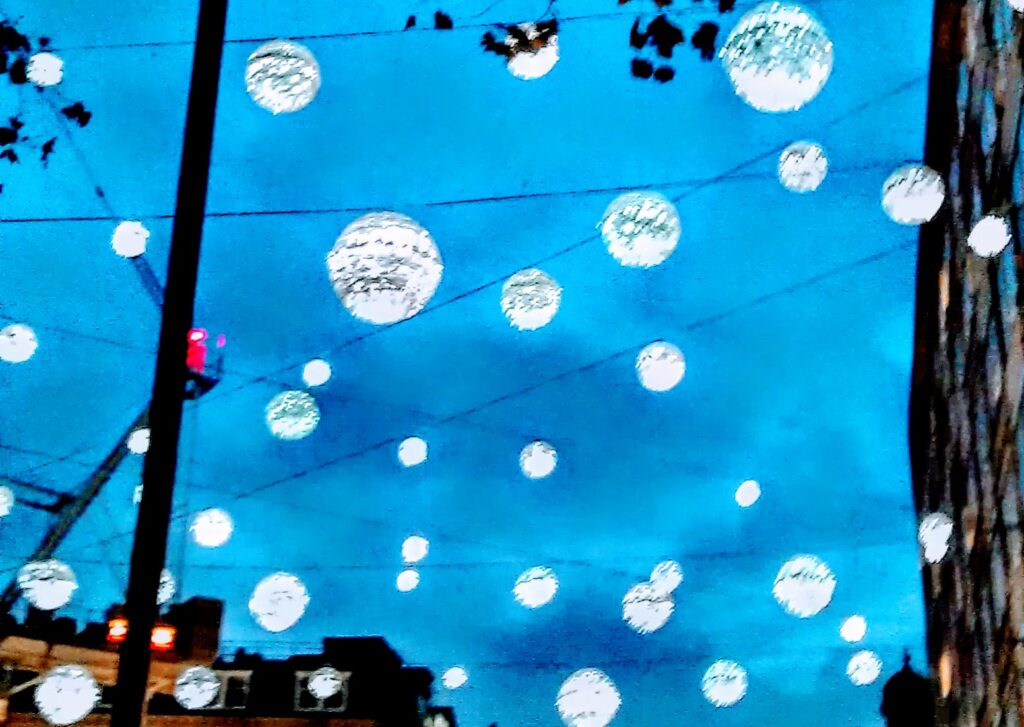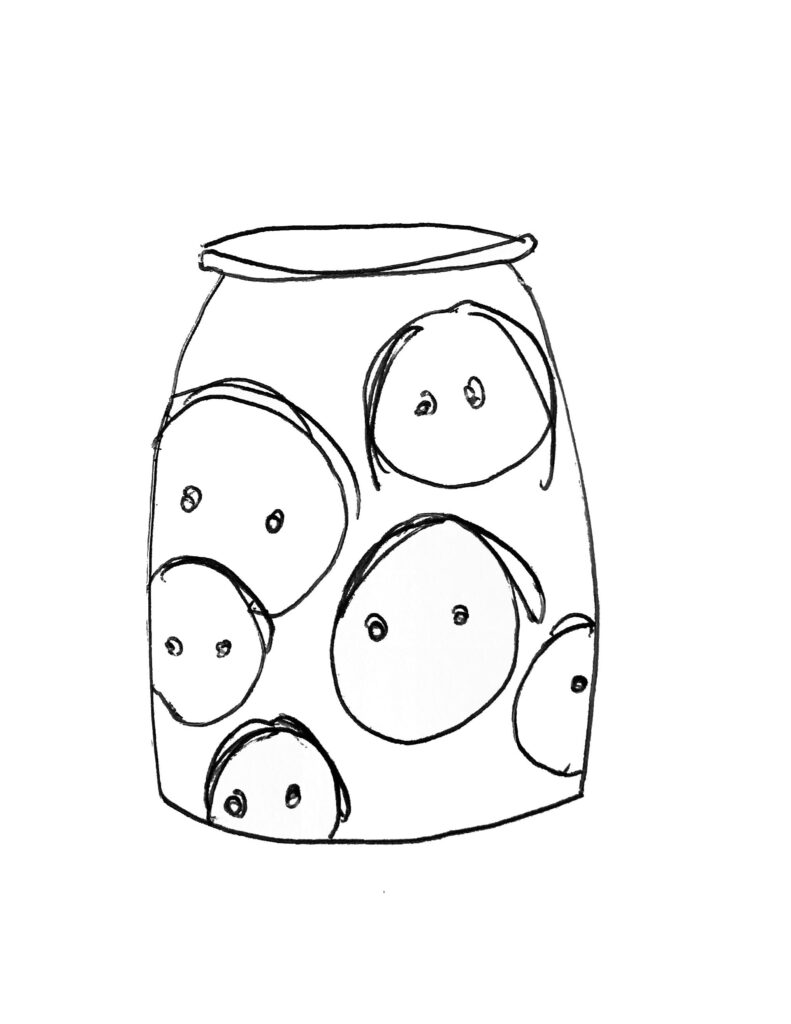
Alan Buckley and Charlotte decided to frame their sample Understory Conversation as a ‘poem exchange’: they each chose a poem of the other’s to respond to. First up, Alan’s poem ‘Peaches’.
Peaches Truly they’re God’s own fruit, glowing like little suns. We name their juice nectar. Apples and pears can’t rival their tender beauty. And yet they struggle, don’t know how to handle the market’s jostle. They keep to themselves, try and avoid the mêlée of bruising fingers. Then a careless nail nicks the velvety blush, leaves them weeping. No wonder so many evolve, adapt. Their view is opaque, tightly curved. We knock on the tin. Perhaps they’re asleep? They can’t be touched. In their dark world they sit motionless, doped with syrup, not sure if they’re hiding or trapped. Alan Buckley, from Touched, HappenStance, 2020
Charlotte Gann: I love this poem of yours, Alan. It seems to me immaculate – like the sonnet form, with its lovely end-rhyme clasps, that contains it. Like the tin those peaches sit in.
It starts with its oddly almost glorified language – is it a direct reference to a biblical or literary quotation? But ‘Truly’ and ‘God’s own fruit’: it’s a wonderfully dramatic opening, like a sweep of an arm on stage. I love the ‘glowing / like little suns’; and the almost melodramatic ‘We name their juice nectar’: who are ‘we’? What’s going on here? I’m getting a little uncomfortable, like someone’s being set up by the ‘group’: so much projection is going on, these poor peaches yanked up on their apparent pedestal…
It is confining, stagnating – to be defined from outside, and glorified. (I’m reminded faintly of your ‘Being a Beautiful Woman’ poem.) ‘Apples and pears can’t rival their tender / beauty. And yet they struggle…’ I adore the poem from this moment forth. I empathise utterly with those poor peaches. (It reminds me of the close to Edward Thomas’s ‘Aspens’, with which we prefaced my collection The Girl Who Cried: ‘Whatever wind blows, while they and I have leaves / We cannot other than an aspen be…’) And your choice of words is so in keeping with your subject, that ‘mêlée’, with its almost fussing accents, ‘bruising fingers’, ‘a careless nail / nicks the velvety blush, leaves them weeping.’ I can picture this all so clearly.
And then on the turn we move into the sestet and somehow immediately the metaphor is much more fully inhabited and realised: these are a type of sensitive people?
And you’re into the subject of HOW these who can’t ‘handle the market’s jostle’ cope – and the high price they pay. They cower, hide, ‘evolve, adapt’. You keep the intrusive ‘we’ firmly in your picture. (I love ‘our’ voice of this poem: it’s like my ‘We do not want to know about the rocks’ – it’s a collective, societal ‘we’?) ‘We knock on the tin’ – which isn’t terribly kind of ‘us’. ‘Perhaps they’re asleep?’ – the chance would be a fine thing.
And then, to the crux. Those last three lines, including their echo of your whole collection title – Touched. Here it comes: how we live if we’re not careful. Cut off – from others, from our own feelings; living small and isolated, traumatised and disenfranchised. And that absolutely spot on, stunning closing notion: never sure if we’re ‘hiding or trapped’ – just how hard it can eventually become to even distinguish between these two…
They can’t be touched. In their dark world
they sit motionless, doped with syrup,
not sure if they’re hiding or trapped.

(p.s. This is a picture I doodled after I first read your poem. It ended up an illustration in the HappenStance book of poetry prompts, Unlocked, 2020, as well as on a t-shirt of mine!)
Alan Buckley: ‘Peaches’ wasn’t the poem of mine I expected you to pick Charlotte, but I’m glad you did. It seems like a robust and durable poem to me, one that still feels fresh and highly charged despite it being one of the oldest poems in Touched. On a drab February morning in 2006 I was feeling despondent and thoroughly overwhelmed by the basic demands of daily life. I was experiencing that kind of paralysis that comes from feeling everything too deeply. I felt horribly thin-skinned, and in that moment the image came to me of a bowl of peaches wishing they could be more able to withstand the world’s rough-and-tumble. I wrote a nine-line poem, called ‘Sometimes, they long to be watermelons’:
Observe these peaches, how easily they bruise. Even loving fingers (applying fractionally too much pressure) leave their permanent mark, brown imprints of a heavier world. Notice how (without cruel intention) a straying nail nicks the velvety blush. Small wonder then, how often we find them sitting in tins.
I reworked it into a sonnet in late 2007. Although I’ve always been a fan of using slant rhymes (as I do in ‘Peaches’), I’ve not always been so willing to let the metrics of my sonnets be so loose. The octave shifts between four- and five-stress lines, and the rhythm is primarily iambic. The feel is of facts being laid out, in a matter-of-fact way. The sestet is more strongly in triple-metre, that falling rhythm that always sounds rather mournful in English. The lines are all four-stressed, except for the last one which has three stresses. For me there’s both a heightening of feeling, and a growing sense of constriction, that culminates in the final chiming of ‘trapped’ with ‘adapt’ at the end of line 9. None of this was deliberately engineered – I simply followed the poem through its drafts where it needed to go. I just wish I could write poems where the form and content were so powerfully coupled more often!
Comparing the sonnet and its predecessor I’m struck by just how much angrier ‘Peaches’ is. The glorification that you pick up on – I like how you talk about ‘the poor peaches yanked up on their apparent pedestal’ – reflects the sense I have of heightened sensitivity being highly valued by wider society in some situations, but denigrated when its expression creates too many ripples, too much discomfort. A bit like Hélder Câmara’s comment about being called a saint when he fed the poor, but being called a communist when he asked why they were poor. And people tend to love Counsellor Deanna Troi from Star Trek: The Next Generation, without necessarily reflecting on what it might be like to be picking up on emotional states and atmospheres all the time, like a radio without an off switch that’s tuned into all stations simultaneously.
There’s another significant change between the two versions. In the earlier watermelon poem the fingers are described as ‘loving’, and the ‘straying nail’ is relieved of responsibility by the phrase ‘without cruel intention’. Aren’t these the classic ways that we can evade fully owning the impact of our behaviour, by asserting that we were acting out of love, or that we didn’t intend to cause harm? I think removing those excuses is also part of what makes ‘Peaches’ a darker, angrier poem than its predecessor. I know that when I was redrafting the poem into a sonnet I had in mind my experiences of being at secondary school, in an almost totally male environment, where I had no control over how people spoke to me, no control over how my body was touched, or by whom. A lot of unpleasant things were done there in the name of care or love, as well as in the name of discipline and toughening me up.
There’s nothing I’d want to add to your brilliant exposition of the sestet. I remember taking ‘Peaches’ to a Poetry School workshop where someone argued vociferously that the poem was a failure because the development of the metaphor was ‘wrong’. The peaches, they said, don’t ‘evolve, adapt’; they don’t put themselves into tins – other people do. Strictly speaking that’s true, of course. But I think one of the things I like about this poem is its choice not to be coy. There is enough hiding going on already, without creating a poem whose subjects can be further ignored. It would have been possible to write a poem where the tenor of the metaphor (highly sensitive people) was completely tucked-in behind the vehicle (the peaches) – a poem, in other words, that could conceivably just be about peaches. I often like poems that do that sort of thing. But the HSPs* in this poem are too angry, too full of distress and despair, to allow that to happen.
(*The abbreviation ‘HSP’ comes from Elaine Aron’s book The Highly Sensitive Person, which was discussed in a previous Understory Conversation. I first read the book in 2002, and it was a book that genuinely changed my life.)
CG: This is what I like best of all about the poem, I think. For me, that anger, distress and despair come ringing through. They did the first time I read it. (I like the sonnet a lot more than your shorter earlier version, and I think that’s because you’ve removed those qualifiers.)
You know those moments when you encounter a poem and realise it really is delivering the goods you’ve been looking for? That’s what happens for me with this one. It says something I haven’t heard elsewhere or seen expressed quite like this before, but instantly I recognise as something I know all about, and deeply.
Thank you, Alan. We’ll share our exchange about the poem of mine you chose in our next post.
- Touched by Alan Buckley is available from HappenStance
